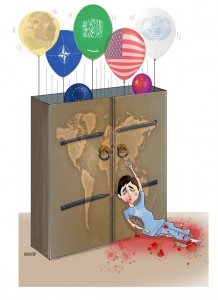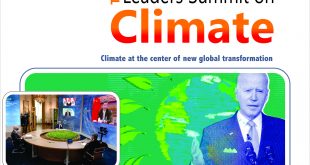Intra-Afghan Dialogue and Response of the Kabul Regime
Mairaj ul Hamid Nasri
Afghanistan has seen a variety of peace processes and positive developments as well as many disappointments on the part of its government and the global community. But the reality is that no fruitful outcomes from these processes have been seen, and the Afghans are still living a miserable life. In this backdrop, the recent initiative by former president Hamid Karzai – with the covert support of Kabul regime, though – to bring Afghans and the Taliban to the negotiating table to carve out a negotiated settlement of the problem has kindled another ray of hope for peace in Afghanistan. Media reports suggest that the two sides have almost reached a deal, though some troubling and critical points of disagreement are still to be settled.
The Afghan peace process was initiated during the Hamid Karzai era in 2005, and it saw many ups and downs during his tenure. The Afghan High Peace Council was constituted and Istanbul Process was also kicked off in 2012 when Karzai was the president of Afghanistan. He had personal relationships with many of the Taliban interlocutors and enjoys somewhat sway over them. Although his personality may be controversial in many respects for some people, yet his re-entry in the peace process seems a good omen for restoration of peace in Afghanistan.
Afghan leaders have held three meetings with Taliban interlocutors in Moscow and Doha. Media reports suggest that the two sides have agreed upon some crucial points but a serious issue which is yet to be settled is the future political system of Afghanistan and the current constitutional arrangement in the country. The Taliban insist that Afghanistan will be an Islamic emirate while the leftists want a republic for future political settlement.
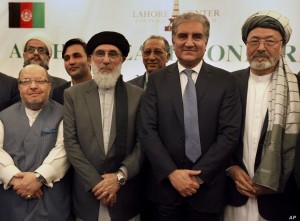 Interestingly, the Taliban had clearly refused to hold talks with the Afghan government but somehow they got ready to negotiate with some Afghan leaders who have the backing of the Kabul regime. Afghan President Ashraf Ghani has also started preparations for a possible settlement with the Taliban. While addressing the Geneva Conference on Afghanistan, President Ghani shared the roadmap for peace with the Taliban. He informed the participating delegates: “We have formed the required bodies and mechanisms to pursue a peace agreement. We are now moving ahead into the next chapter of the peace process.” He also pointed out that the Afghans seek a peace agreement whereby the Taliban would be included in a democratic and inclusive society, respecting the constitutional rights and obligations of all citizens, especially women. The Constitution of the country is acceptable to both parties and the amendments to it would be through the constitutional mechanism. Moreover, the Afghan National Defence and Security Forces and civil service will function according to the law of the land. No armed groups having ties with transnational terrorist networks or transnational criminal organizations, or with state/non-state actors seeking influence in Afghanistan, will be allowed to join the political process.
Interestingly, the Taliban had clearly refused to hold talks with the Afghan government but somehow they got ready to negotiate with some Afghan leaders who have the backing of the Kabul regime. Afghan President Ashraf Ghani has also started preparations for a possible settlement with the Taliban. While addressing the Geneva Conference on Afghanistan, President Ghani shared the roadmap for peace with the Taliban. He informed the participating delegates: “We have formed the required bodies and mechanisms to pursue a peace agreement. We are now moving ahead into the next chapter of the peace process.” He also pointed out that the Afghans seek a peace agreement whereby the Taliban would be included in a democratic and inclusive society, respecting the constitutional rights and obligations of all citizens, especially women. The Constitution of the country is acceptable to both parties and the amendments to it would be through the constitutional mechanism. Moreover, the Afghan National Defence and Security Forces and civil service will function according to the law of the land. No armed groups having ties with transnational terrorist networks or transnational criminal organizations, or with state/non-state actors seeking influence in Afghanistan, will be allowed to join the political process.
These are, however, the critical points which Taliban have not accepted in toto; rather they have a different point of view and their own perspective for solving these issues. They have reportedly reiterated many a time that they will accept only those conditions that are in accordance with the basic principles of Islam and welfare of the Afghans. Regarding the influencing factor of status-quo, President Ghani warned that peace in Afghanistan must be built from the ground up so that the citizens own this peace agreement, and not the elites.
Nonetheless, the Afghan government has formed a 12-member negotiating team, which comprises both women and men and is led by presidential Chief of Staff Salam Rahimi, for holding meetings with the Taliban. Kabul has also formed a peace advisory board so as to provide input into the interlocutors. The board consists of nine committees representing diverse sectors of the Afghan society. The government plans to restructure the Afghan High Peace Council with the focus on post-peace settlements and scenarios.
The proposed peace plan, which President Ghani shared at the Geneva Conference, contains the following points:
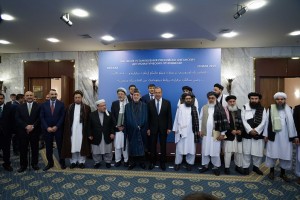 At first, a negotiating team, led by presidential Chief of Staff Salam Rahimi, has been established to negotiate peace with the Afghan Taliban. The team includes women and men who have the necessary credentials to deal with the key challenges of peace negotiations.
At first, a negotiating team, led by presidential Chief of Staff Salam Rahimi, has been established to negotiate peace with the Afghan Taliban. The team includes women and men who have the necessary credentials to deal with the key challenges of peace negotiations.
Secondly, for ensuring consensus and providing direction to the negotiating team, diverse groups of individuals will constitute a new Peace Advisory Board to provide timely advice on critical issues during peace negotiations.
Thirdly, the Afghan High Peace Council, based on their own request and with support from the National Unity Government, will be restructured for focusing on public awareness and providing advice regarding post-peace scenarios.
Fourthly, the government will proceed with a five-phase approach, commencing with an intra-Afghan dialogue, followed by discussions with Pakistan and the United States along with participation of regional actors, the Arab-Islamic world, and finally, NATO and non-NATO countries.
Fifthly, negotiations will prioritize implementation, confidence-building measures such as time constraints, and the agreement on a method of ratification of a peace settlement.
Based on the peace plan, the new Peace Advisory Board comprises nine committees which include, Political Leaders Committee, Political Parties Committee, Youth Affairs Committee, Women’s Affairs Committee, Ulema Committee, Provincial Leaders Committee, Civil Society and Cultural Committee, Private Sector Committee and Refugees and Diaspora Committee.
In a nutshell, the Afghan government has prepared itself and is presenting its preparations to the international community as a big achievement. Surprisingly, the government has made necessary arrangements but the Taliban have challenged the very existence and legitimacy of the Afghan government, and till this day they are not ready to sit with the government for negotiations. However, it is the responsibility of the Afghan government to take every possible step and go for any extent for persuading the Taliban for a negotiated settlement for ensuring peace and stability in the war-torn country. It is important to mention that the Peace Conference held in Bhurban, Murree, which saw the participation of many Afghan political leaders including Hizb-e-Islami Chief Engineer Gulbuddin Hekmatyar is another parallel struggle to pave the way for restoration of peace in Afghanistan. This conference has ensured the Afghans that Pakistan does not favour any specific group in Afghanistan rather it supports all the Afghans for bringing stability to Afghanistan.
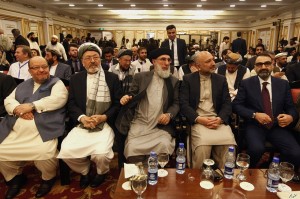 Furthermore, Zalmay Khalilzad, the Special Representative for Afghanistan Reconciliation, on his part has certain achievements in this regard as some people suggest that the Taliban have held these meetings with the Afghan leaders on the persuasion of Khalilzad. Khalilzad had worked as the US ambassador to Afghanistan with Karzai regime so has a working relationship with Hamid Karzai. The coordination of these two may prove pivotal for reaching a peace agreement.
Furthermore, Zalmay Khalilzad, the Special Representative for Afghanistan Reconciliation, on his part has certain achievements in this regard as some people suggest that the Taliban have held these meetings with the Afghan leaders on the persuasion of Khalilzad. Khalilzad had worked as the US ambassador to Afghanistan with Karzai regime so has a working relationship with Hamid Karzai. The coordination of these two may prove pivotal for reaching a peace agreement.
In the end, it is apt to suggest that the democratically-elected government of Ashraf Ghani should use all the potentials for restoring peace in Afghanistan; even shunning of some of the conditions for persuading Taliban for peace is not a bad deal. Parliamentary or presidential system is not a divine commandment; both the parties may agree upon another system that is acceptable to, and is in better interest of, the Afghans. The system may be amalgamation of these two systems or any other system that is in accordance with the local culture, sustainable enough to be replicated in the long run and most importantly oriented towards the welfare of Afghan nation.
The author is faculty member in department of Political Science at University of Malakand, Chakdara. He can be reached at mairajulhamid717@gmail.com.
 Jahangir's World Times First Comprehensive Magazine for students/teachers of competitive exams and general readers as well.
Jahangir's World Times First Comprehensive Magazine for students/teachers of competitive exams and general readers as well.
